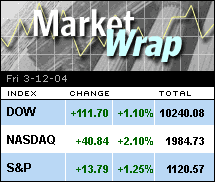NEW YORK (CNN/Money) -
U.S. stocks rallied Friday, as the major indexes bounced after a steep four-session selloff and seven weeks of mostly rangebound trading.

The Dow Jones industrial average (up 111.70 to 10240.08, Charts) added 1.1 percent and the Standard & Poor's 500 (up 13.79 to 1120.57, Charts) index added 1.25 percent. The Nasdaq composite (up 40.84 to 1984.73, Charts), the strongest of the three, rose 2.1 percent. But all three ended the week with losses of more than 3 percent.
After drifting in a flat to lower range for the previous seven weeks, this week it has been all about declines for the stock market. Four days of what many analysts are calling a correction eased a bit Friday.
"I think everybody was looking for a correction in the market," said David Briggs, head of equity trading at Federated Investors. "If you look at most bull markets, you do usually see a few pullbacks of at least 5 percent."
Between last Friday and this Thursday, the Dow had lost 4.4 percent, the S&P 500 4.3 percent and the Nasdaq just over 5 percent.

"I get the impression that every pullback this year has been met with new buyers coming in," Briggs added. "There's still plenty of money out there that people are willing to put back into stocks."
But even with the gains on Friday, the market closed lower on the week.
This week, the Dow lost 3.3 percent, the S&P 500 lost 3.1 percent and the Nasdaq lost almost 3.1 percent. All three had closed the previous week higher.
Next week brings earnings from a number of banks, including Lehman Bros. on Tuesday.
Before the bell Monday, earnings are due from ImClone Systems (IMCL: Research, Estimates), the controversial biotech that just received regulatory approval for its colon cancer treatment Erbitux. Martha Stewart Living Omnimedia (MSO: Research, Estimates) founder and namesake Martha Stewart was recently convicted of lying about a sale of the stock which preceded the public announcement of an earlier regulatory rejection for Erbitux.

ImClone is expected to post a loss of 32 cents per share, according to Reuters estimates, narrower than the 54-cents per share loss it posted a year earlier.
A batch of manufacturing reports are due throughout the week including several on Monday. Expected before the bell, the NY Empire State index is expected to show a drop to 38.9 in March from 42.05 in February, according to Briefing.com estimates. Industrial production for February is thought to have risen 0.4 percent after rising 0.8 percent in January. Capacity utilization for February is expected to be at 76.4 percent, up from 76.2 percent last month.
What moved
Putting behind terrorism concerns after Thursday's attacks in Madrid, as well as the morning's mixed news on the economy, investors jumped back with renewed interest, especially toward technology stocks.
A number of technology shares that had been hit throughout the week bounced back. IBM (IBM: up $2.09 to $93.30, Research, Estimates) and Intel (INTC: up $0.61 to $27.69, Research, Estimates) climbed 2.3 percent and Cisco Systems (CSCO: up $0.79 to $23.13, Research, Estimates) gained 3.5 percent.
Dell (DELL: up $1.06 to $33.05, Research, Estimates) climbed 3.3 percent after Morgan Stanley upgraded it to "overweight" from "equal-weight" citing the stock's positive outlook and its valuation relative to the industry. J.P. Morgan also upgraded the stock.
Business software maker Oracle (ORCL: Research, Estimates) fell 1.5 percent and topped the Nasdaq's most-actives list. After the close Thursday, the company reported earnings of 12 cents per share versus 11 cents per share a year ago, in line with analysts' estimates. The company is in the midst of a hostile takeover bid for PeopleSoft (PSFT: up $0.77 to $19.68, Research, Estimates) that has been challenged by the Department of Justice.
Also on the downside, Dow component Altria (MO: down $2.01 to $54.31, Research, Estimates) lost 3.5 percent and was one of only two Dow decliners after Prudential Securities downgraded it to "neutral" from "overweight," citing concerns about its Philip Morris USA unit. In particular, the brokerage cited the unit's ongoing litigation issues, as well as the lack of improvement in overall tobacco industry fundamentals.
Among the Dow's biggest gainers: Walt Disney (DIS: up $1.15 to $26.10, Research, Estimates), which gained 4.6 percent and Eastman Kodak (EK: up $0.80 to $26.23, Research, Estimates), which rallied 3.1 percent.
Market breadth was overwhelmingly positive. On the New York Stock Exchange, where 1.38 billion shares traded, advancing issues held a nearly three-to-one lead over decliners. On the Nasdaq, gainers beat losers by the same margin as 1.67 billion shares changed hands.
Stock investors shrugged off the morning's economic news, including the most anticipated report -- the University of Michigan's preliminary read on consumer sentiment for March. The index dipped to 94.1 in March from 94.4 in February. Economists surveyed by Briefing.com thought it would rise to 95.
The consumer sentiment numbers, however, were enough to give an already rising dollar a further boost against the euro and the yen.
Treasury bond prices fell, with the 10-year note losing 23/32 of a point in price, pushing its yield up to 3.77 percent from 3.69 late Thursday. Bond prices and yields move in opposite directions.
Among commodities markets, NYMEX light sweet crude oil futures fell 57 cents to settle at $35.57 a barrel. COMEX gold shed $5.40 to settle at $395.60 an ounce.

|

